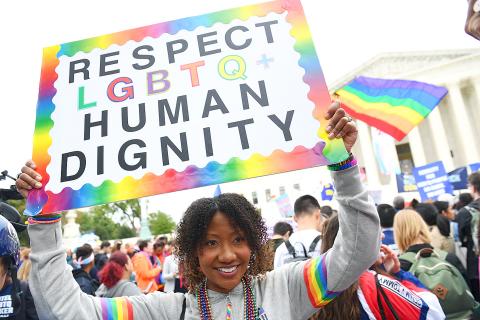A few years ago Emily Gardner, who identifies as “more feminine than not,” instructed family members of a new preference to be referred to as “they” rather than “she.”
The 23-year-old represents a growing trend among progressive Americans, who are claiming a right to choose their own pronoun, regardless of their sex at birth.
It is a battle playing out on business cards, in email signatures and on social networks, where many people are identifying their preferred pronoun outright.

Photo: AFP
And “they” is gaining ground as the pronoun of choice by “non-binary” people who identify neither as male or female. The Philadelphia bookstore that employs Gardner is on board, with a sign taped to the counter reads: “Please do not assume staffers’ pronouns, ask.”
‘NOT SOMETHING NEW’
“Non-binary people have existed forever. It’s not something new, not a trend, it’s just who we are,” said Pidgeon Pagonis, a Chicago artists who goes by the pronoun “they.”
“When people don’t respect my pronouns I coil up inside, I don’t feel good” said Pagonis, who launched the apparel brand “Too Cute To Be Binary.”
Gender-neutral pronouns, long confined to the LGBTQ community, “are becoming increasingly popular, including beyond big cities,” said sociologist Carla Pfeffer.
“The rise of social media means that cultural transformations can happen faster and disseminate more broadly than in earlier eras,” Pfeffer said.
It also helps that non-binary people are enjoying increased representation on television and in pop culture, such as British artist Sam Smith, who recently revealed a preference for “they/them” pronouns “after a lifetime of being at war with my gender.”
However use of “they” is not trending in all quarters and can give rise to mockery, with critics denouncing it as politically correct overkill.
“At a Starbucks this morning & the baristas had their approved gender pronouns,” pro-Trump conservative activist Charlie Kirk recently tweeted.
“We are creating a society of people waiting to be offended,” he said.
‘IT MAKES ME ANGRY’
Mallory Cross, whose hair is cut short, said “I think I’m aware of how I look like and how people read me, I’m very masculine.”
“When I make such an effort to look that way and people call me ‘ma’am’ or hold the door it makes me angry,” Cross said.
In New York, a “gender-neutral” boutique clothing store called The Phluid Project sells skirts, caps and shoes with large heels, encouraging customers “to go beyond binaries.”
The US financial capital in particular has embraced this mindset, offering a new neutral category that people can use to amend the gender on their birth certificates since January.
Merriam-Webster dictionary meanwhile recently added the word “they” as a non-binary pronoun that can refer to just one person. And Apple has added “neutral” emojis that don’t distinguish between genders to the latest version of its operating system.
As the trend catches on, a growing number of binary people are even displaying the pronouns “she/her” or “him/he” on social media accounts and elsewhere as a sign of solidarity.
Elizabeth Warren, one of the frontrunners in the crowded 2020 US Democratic primary field, last month became the sixth candidate to add her pronoun, which corresponds to her birth sex, on her social media.
“Every person deserves to be treated with dignity and respect, and that starts with using correct pronouns. I’m Elizabeth. My pronouns are she/her/hers,” she wrote on Twitter.
Candidate Pete Buttigieg, who is gay, has specified that he is a “he/him” and heterosexual candidates Julian Castro, Cory Booker, Kamala Harris and Tom Steyer have also indicated their pronouns.

June 2 to June 8 Taiwan’s woodcutters believe that if they see even one speck of red in their cooked rice, no matter how small, an accident is going to happen. Peng Chin-tian (彭錦田) swears that this has proven to be true at every stop during his decades-long career in the logging industry. Along with mining, timber harvesting was once considered the most dangerous profession in Taiwan. Not only were mishaps common during all stages of processing, it was difficult to transport the injured to get medical treatment. Many died during the arduous journey. Peng recounts some of his accidents in

“Why does Taiwan identity decline?”a group of researchers lead by University of Nevada political scientist Austin Wang (王宏恩) asked in a recent paper. After all, it is not difficult to explain the rise in Taiwanese identity after the early 1990s. But no model predicted its decline during the 2016-2018 period, they say. After testing various alternative explanations, Wang et al argue that the fall-off in Taiwanese identity during that period is related to voter hedging based on the performance of the Democratic Progressive Party (DPP). Since the DPP is perceived as the guardian of Taiwan identity, when it performs well,

A short walk beneath the dense Amazon canopy, the forest abruptly opens up. Fallen logs are rotting, the trees grow sparser and the temperature rises in places sunlight hits the ground. This is what 24 years of severe drought looks like in the world’s largest rainforest. But this patch of degraded forest, about the size of a soccer field, is a scientific experiment. Launched in 2000 by Brazilian and British scientists, Esecaflor — short for “Forest Drought Study Project” in Portuguese — set out to simulate a future in which the changing climate could deplete the Amazon of rainfall. It is

The Taiwan People’s Party (TPP) on May 18 held a rally in Taichung to mark the anniversary of President William Lai’s (賴清德) inauguration on May 20. The title of the rally could be loosely translated to “May 18 recall fraudulent goods” (518退貨ㄌㄨㄚˋ!). Unlike in English, where the terms are the same, “recall” (退貨) in this context refers to product recalls due to damaged, defective or fraudulent merchandise, not the political recalls (罷免) currently dominating the headlines. I attended the rally to determine if the impression was correct that the TPP under party Chairman Huang Kuo-Chang (黃國昌) had little of a